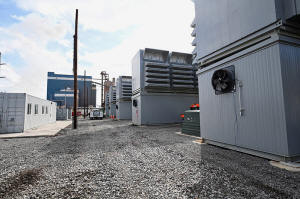AI's race for US energy butts up against bitcoin mining
 Send a link to a friend
Send a link to a friend
 [August 28, 2024] By
Laila Kearney and Mrinalika Roy [August 28, 2024] By
Laila Kearney and Mrinalika Roy
U.S. technology companies are pursuing energy assets held by bitcoin
miners as they race to secure a shrinking supply of electricity for
their rapidly expanding artificial intelligence and cloud computing data
centers. Those data centers are driving the fastest U.S. power demand
growth since the start of the millennium, outpacing grid expansions and
leaving giant technology companies, like Amazon and Microsoft, to
scavenge for vast amounts of electricity.
The electricity scramble is jolting the energy-intensive cryptocurrency
mining industry. Some miners are making huge profits leasing or selling
their power-connected infrastructure and sites to tech, while others are
losing access to the electricity needed to stay in business. "The AI
battle for dominance is a battle being had by the biggest and best
capitalized companies in the world and they care like their lives depend
on it that they win," said Greg Beard, CEO of Stronghold Digital Mining,
a publicly-traded bitcoin mining company. "Do they care about what they
pay for power? Probably not."
Data centers could use up to 9% of total electricity generated in the
U.S. by the end of the decade, more than doubling their current
consumption, as technology companies pour funds into expanding their
computing hubs, the Electric Power Research Institute said in May.
Currently, data centers account for about 1%-1.3% of global electricity
consumption, versus crypto mining's roughly 0.4%, according to the
International Energy Agency. That disparity is expected to grow.
Analysts expect 20% of bitcoin miner power capacity to pivot to AI by
the end of 2027. Over the past year, bitcoin miners and AI data center
owners have increasingly vied for the same power assets and contracts,
executives from over half-dozen publicly traded U.S. crypto mining
companies told Reuters. Marathon Digital Holdings, the world's biggest
publicly traded bitcoin miner, was among those eyeing a nuclear-powered
data center owned by Talen Energy in Pennsylvania, two sources familiar
with the situation said. "We are always willing to talk with anyone who
is looking to sell a data center," Marathon said, without confirming
specific interest in the site. Amazon, with a market capitalization of
more than 350 times the size of Marathon, bought the center in a deal
announced in March and secured enough electricity to power nearly all
the homes in New Mexico.

GROWING INTEREST Many large miners that own land and power hookups are
shifting strategies from exclusively crypto mining to marketing their
property and energy services to AI and cloud computing businesses.
"We've gotten a lot of interest from everyone from an Amazon or Google,"
said Kerri Langlais, chief strategy officer of bitcoin miner TeraWulf,
which has a site in upstate New York that is capable of up to 770
megawatts (MW). The frenzy of tech prospects for miners kicked off in
June, when crypto miner Core Scientific - fresh out of bankruptcy –
became the first to announce a major agreement to lease its
power-connected facilities to Nvidia-backed CoreWeave in deals estimated
at over $6.7 billion over 12 years. Several miners have since said they
would lease, or act as subcontractors to develop AI data centers. New
data centers, which have typically been around 20 MW, are being built up
to 1,000 MW today. But wait times to connect new power supplies in the
United States can take several years.
[to top of second column] |

A group of buildings housing cryptocurrency miners sits in the
foreground of a power generating station at the Scrubgrass Plant in
Kennerdell, Pennsylvania, U.S., March 8, 2022. REUTERS/Alan
Freed/File Photo

For crypto miners with large energy assets, repurposing their
operations for AI and cloud computing could make their facilities as
much as five times more valuable, Morgan Stanley research showed.
Buying or leasing space at a miner with at least 100 MW of capacity
can cut the wait times for a data center to launch by about 3.5
years, saving technology companies billions, Morgan Stanley said.
TOUGH TRANSITION
Still, the handoff of electricity supplies and infrastructure to
tech companies from crypto miners will not be seamless for most, if
at all possible, several miners said.

"Most bitcoin miners that are out there saying they are going to do
AI don't really know what they're getting into," said CleanSpark CEO
Zach Bradford, adding his company will stick with crypto mining as
its core business.
About 90% of the country's bitcoin mines can be constructed in six
to 12 months, versus three years for a more sophisticated data
center, Bradford said.
Those mines, he added, would have to be rebuilt to incorporate
specialized cooling structures and other infrastructure to be used
for AI or cloud computing.
The high costs of building AI data centers would be a barrier to
many crypto miners, who were largely barred from accessing capital
after a 2022 bitcoin price crash, said Sergii Gerasymovych, CEO of
EZ Blockchain, which supplies equipment and services for crypto
mining.
This year, EZ Blockchain had a 10-MW project in the works with a
South Carolina utility until the utility contracted for 100 MW with
a hyperscaling AI company.
Hyperscalers include the world's biggest technology companies that
operate massive global networks of data centers and cloud
infrastructure.
While the financial details of the AI data center deal were unclear,
Gerasymovych said the company he was up against had billions of
dollars of capital to play with.
"For them, it's about speed to market and they're just throwing
money around," he said. "What is there to compete with?"
(Reporting by Laila Kearney and Mrinalika Roy; Editing by Marguerita
Choy)
[© 2024 Thomson Reuters. All rights
reserved.]
This material may not be published,
broadcast, rewritten or redistributed.
Thompson Reuters is solely responsible for this content.
 |